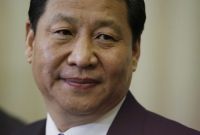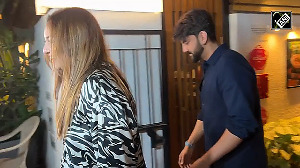 Xi Jinping was on Thursday appointed the new general secretary of China's ruling Communist Party of China in a smooth power transition that ushered in a fifth generation of leaders to steer the world's second largest economy over the next decade, ending the 10-year reign of President Hu Jintao.
Xi Jinping was on Thursday appointed the new general secretary of China's ruling Communist Party of China in a smooth power transition that ushered in a fifth generation of leaders to steer the world's second largest economy over the next decade, ending the 10-year reign of President Hu Jintao.
59-year-old Xi, who was the vice president till now, will replace Hu as president in March, while Li Keqiang, 57, will succeed Prime Minister Wen Jiabao.
Xi was also named the chief of the 2.3 million-strong People's Liberation Army, the world's largest standing military, allowing the new leader to have a free hand in running the most populous nation.
The fifth generation of CPC leaders was formally unveiled to the media at the cavernous Great Hall of People overlooking Tiananmen Square in an event telecast live all over the country, bringing an end to the intense jockeying for power among various sections of the world's biggest political party having reported membership of over 80 million.
Other members of the all-powerful Politburo Standing Committee of the CPC included Zhang Dejiang, Yu Zhengsheng, Liu Yunshan, Wang Qishan and Zhang Gaoli.
Former President Jiang Zemin took the centre stage at the week-long 18th Party Congress, both at its inaugural and valedictory meetings sitting between Hu and Wen.
Ten years after his retirement as CPC chief, Jiang, 86, continued to be 'backroom boss' of the party earning the tag of 'king maker' as most of the leaders who got elected to the
Central Committee on Wednesday were reportedly close to him.
In a wide-ranging speech after his appointment as CPC chief, Xi said corruption and alienation of party officials from people were the main problems confronting the country.
"Under the new conditions, our party faces many severe challenges, and there are also many pressing problems within the party that need to be resolved, particularly corruption, being divorced from the people, going through formalities and bureaucratism caused by some Party officials," he said. "We must make every effort to solve these problems."
As per the constitution of the party, its top leadership retires every ten years.
The standing committee has been reduced from nine members to seven, a move Chinese officials say is aimed at improving the coordination of the collective leadership.
Members of the standing committee and politburo are chosen by the party's new central committee comprising 205 members and 171 alternate members.
Besides, the party Congress, which meets every five years, the central committee is the supreme policy-making body.
The new committee was elected "through secret ballot" on Wednesday on the last day of the week-long 18th Party Congress.
While the new leaders would assume charge of the party from Thursday, they would formally take over their roles in government from March next year, when the national legislature called the National People's Congress holds it annual session.
Until then Hu and other leaders would continue in their government posts.
The outgoing standing committee headed by Hu and eight other leaders, including Wen formally retired from the helm of the party.
On the face of it, the once-in-a-decade transition of power appeared smooth against the backdrop of a major conflict involving disgraced leader Bo Xilai, regarded as pro-Maoist who was trying to revive hard-line socialist policies opposing the leadership's reformist ideologies.
On his part, the new leader Xi has worked his way up skillfully making use of his 'princeling' background.
Rising from a village head to a state leader, Xi carried the tag of a 'hereditary' communist for being the son of a former deputy prime minister, who was later persecuted by CPC founder Mao Zedong.
A graduate in Chemical Engineering from China's prestigious Tsinghua University, Xi became well-known after he married Peng Liyuan, a famous Chinese folk singer who was widely popular in 1980s.
Xi had successful stints in power as the secretary of the Communist party's Shanghai unit and won praise for his help in properly holding the 2008 Beijing Olympics.
Like many Chinese leaders, Xi is also an enigma as very little is known about his views and achievements.
Challenges for Xi and his team include rebalancing the economy from export dependent to the one more relying on domestic consumption.
In the face of declining exports, economy slowed down to 7.4 per cent in the fourth quarter missing even the 7.5 per cent target.
But Party officials are confident of tiding over the crisis as the country at present has over 3.20 trillion foreign exchange reserves and adequate cash in hand to come out with a new stimulus to revive growth next year.
Also domestically, ethnic minority regions, Tibet and Xinjiang, were tense with protests against the Chinese rule.
While self-immolation protests escalated in Tibet calling for the return of the Dalai Lama from exile in India, China has deployed a large number of security forces in Uygur Muslim native Xinjiang to control the rise of East Turkistan Islamic Movement.
Ageing population due to One Child Policy and rising wealth gap between rich and poor were other major issues posing a major challenge to the new leadership.
Outgoing leader Hu also identified corruption among the party ranks as a key problem and called for urgent steps to curtail it failing which China could collapse.











 © 2025
© 2025